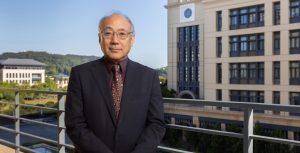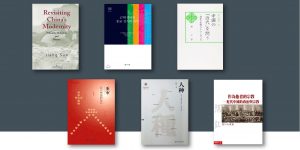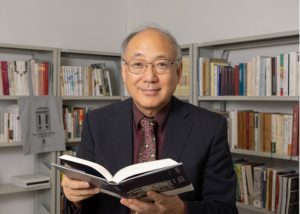Sun Jiang, chair professor and head of the Department of History at the University of Macau (UM), describes himself—half-jokingly—as both a typical and an atypical historian. Over the course of a four-decade academic career, he has earned a reputation for rigorous scholarship and a distinguished academic lineage. At the same time, his research consistently pushes beyond conventional boundaries of time, discipline, and geography. With a scholarly journey that has taken him from Nanjing to Tokyo, back to China, and ultimately to Macao, Prof Sun considers himself an academic nomad. Since joining UM in 2024, he has been dedicated to reinterpreting and reshaping the historical narratives of Macao.
An Academic Nomad
Prof Sun describes himself as an academic nomad, continually adapting his research focus as he moves from place to place. This adaptability is rooted in his life journey: born in Yangzhou in 1963, he grew up in Ili, Xinjiang, before returning to Jiangsu for high school. In 1981, he enrolled at Nanjing University, where he studied under the esteemed historian Cai Shaoqing. Cai’s mentor, Shao Xunzheng, a Peking University history professor and grandson of late Qing Dynasty Guizhou commissioner Shao Jicheng, was a student of the renowned historian and diplomat Jiang Tingfu. Inspired by this distinguished academic lineage, Prof Sun has embraced a life of extensive travel, mastered multiple languages, and adopted diverse research methods drawn from both Chinese and Western traditions.
After earning his master’s degree early from Nanjing University, Prof Sun stayed on as a faculty member. To further his research on the history of Christianity, he initially planned to go to the US, but a scholarship opportunity took him to Japan instead. Remarkably, within just one year of self-study during his time in Japan, Prof Sun became fluent in Japanese, which earned him special admission to the University of Tokyo’s Graduate School of Arts and Sciences. Skipping the standard application process, he was accepted directly into the PhD programme in 1993. While completing his doctorate, Prof Sun taught East Asian history in the School of Law at Waseda University and the Faculty of Letters at Komazawa University. After receiving his PhD in 1999, he joined the Department of Intercultural Studies at the Shizuoka University of Arts and Culture as a professor.
During his two decades in Japan, Prof Sun deepened his expertise in social history, memory studies, and intellectual history. He was particularly drawn to the relationship between the past and the present, with a focus on the historical and mnemonic dimensions of the Nanjing Massacre. Beyond his research, Prof Sun was dedicated to mentoring students who shared his academic interests, aiming to foster continued exploration in these areas. This commitment eventually led him back to his alma mater, Nanjing University, where he taught in both the School of Government and the School of History. There, he founded the Xue-heng Institute for Advanced Studies, a research centre devoted to the emerging fields of conceptual history and memory studies. His efforts attracted young scholars from a wide range of disciplines, including history, literature, politics, journalism, and sociology. In 2013, Prof Sun served as the chief expert for the National Social Science Fund Major Project ‘Research on Public Memory and National Identity in Modern China’, which received an ‘excellent’ rating in its final evaluation.
In 2024, Prof Sun joined UM. As one of China’s earliest gateways to the world, Macao holds profound historical significance in the context of both modern Chinese and East Asian history. Prof Sun seeks to reinterpret Macao’s past through the lens of lieux de mémoire (sites of memory), proposing a global historical narrative that places Macao at its centre.
An Academic Organiser
‘Studying history is about resolving the perplexities of life. History is my field, and the entire humanities and social sciences are my methodology,’ Prof Sun says. This philosophy underpins his interdisciplinary approach, which integrates Chinese, Western, and Japanese perspectives while drawing on methodologies from history, political science, anthropology, sociology, and religious studies. In addition to writing his own monographs, Prof Sun has served as editor for numerous book series and journals, making a significant impact on both Chinese and international scholarly communities.
Prof Sun’s career as an academic organiser began early. During his master’s studies, he assisted his supervisor in compiling the Chinese Social History Series (中國社會史叢書), becoming the youngest member of the editorial team. In 2002, he co-initiated the ‘New History’ movement with Prof Yang Nianqun and other scholars, aiming to revive Liang Qichao’s intellectual legacy. This initiative led to the founding of the journal New Social History, later renamed New History. In 2006, Prof Sun broadened his academic contributions by forming a research team on conceptual history at the International Research Center for Japanese Studies, a prestigious national research institute in Japan, to conduct comparative studies.
After returning to China full-time in 2013, Prof Sun focused on Nanjing University’s cultural heritage and its historic symbol, xue heng (學衡). He founded the Xue-heng Institute for Advanced Studies and, over the next decade, edited more than ten book series and journals, including Asian Conceptual History and Xueheng Erya Library. Throughout this period, Prof Sun maintained close ties with the international academic community, participating in numerous collaborative research projects and serving as an editorial board member or guest editor for prominent academic journals.
Prof Sun believes that for UM’s Department of History to become a leading institution in Hong Kong and Macao, it must establish its own academic journal. Therefore, shortly after joining UM, he co-founded Journal of Chinese Public History with Prof Wang Di and other scholars. Furthermore, he emphasises the importance of leveraging Macao’s unique historical and cultural resources to build a distinctive academic brand for the department.
Reimagining Macao Through Lieux de Mémoire
Prof Sun observes that traditional Chinese historiography, exemplified by ancient historian Sima Qian’s aim ‘to explore the relationship between heaven and humanity, and to understand the changes from ancient times to present through history’, emphasises discerning patterns from history. However, since the late 18th century, humanity’s historical development has increasingly been driven by visions of the future.
With Prof Sun as editor-in-chief and translator, the Chinese edition of Les Lieux de Mémoire (Sites of Memory) is being published as a 15-volume series. Originally edited by renowned French historian Pierre Nora, this monumental work compiles extensive research on French collective memory and stands as a cornerstone of memory studies in academia worldwide. The concept of lieux de mémoire—a term that combines lieux (places) and mémoire (memories)—refers to places, objects, events, and even abstract ideas that hold collective memory for a society and play a central role in constructing historical narratives. Lieux de mémoire have three main aspects: 1) Material aspect, which refers to the physical existence of a site, such as archives, commemorative rituals, and generational values; 2) Symbolic aspect, which concerns the meanings and associations that people attach to the site; 3) Functional aspect, which refers to the role a site plays in shaping and transmitting memory.
As people engage in activities and create memories at sites of memory, history becomes connected to the present, offering valuable insights into the future. While introducing Les Lieux de Mémoire to the Chinese-speaking world, Prof Sun has also incorporated its methodologies into his own research.
In Prof Sun’s view, Macao serves as a site of memory that bridges East and West, as well as the past and present. In addition to its World Cultural Heritage sites, Macao’s street names, religions, languages, and customs embody complex and layered memories. Historically, Macao’s development can be divided into three key periods: the pre-colonial period, the colonial period, and the post-handover period. Prof Sun emphasises the importance of applying the lieux de mémoire framework to reimagine Macao’s historical narrative. He explains, ‘Macao’s history is a product of the intersecting forces of colonisation, handover, and globalisation. It should be reinterpreted through a local perspective. Furthermore, Macao can serve as a model for constructing a historical narrative of glocalisation.’
Under Prof Sun’s leadership, the UM Department of History has hosted academic events including the international symposium ‘Macao: A Place of Memory Where East Meets West’ and the workshop ‘Theory and Practice of Sites of Memory’. He emphasises that UM’s interdisciplinary foundation, international faculty, and global exchange network provide a strong platform to advance these research efforts.
Reframing Global History With Macao at the Centre
Prof Sun is currently exploring the construction of a Chinese global history narrative that places Macao at the heart of connections between Europe, Africa, Asia, and the Americas. As globalisation continues to unfold in increasingly complex and unpredictable ways, he sees this as an opportunity for deeper reflection within the field of global history. In his future research, both individual and collaborative, he seeks to build on established frameworks such as dependency theory and world-systems theory, while expanding the focus to include the movement of people, the movement of knowledge, and the movement of spirits, alongside the traditional emphasis on the movement of materials.
To deepen his understanding of Macao’s origins and its broader historical context, Prof Sun travelled to Lisbon this summer—extending his research beyond the Greater Bay Area—where he examined historical materials and visited significant heritage sites. At the Jerónimos Monastery, he conducted a detailed study of the tomb of Luís de Camões, the celebrated poet who once lived in Macao, to examine its historical significance. Since returning to Macao, Prof Sun has continued this research while also learning Portuguese at UM, equipping himself to engage more deeply with Portuguese-language sources. This approach exemplifies his research philosophy, which combines meticulous textual analysis with on-site fieldwork to develop a comprehensive understanding of the contributions of past scholars and the spaces and memories they inhabited.
Slightly more than a year after joining UM, Prof Sun’s office is already packed with books, stacked high and stored in simple metal cabinets. ‘These are books I’ve collected for research purposes, and I’ll give them away once the project is complete,’ he explains. For Prof Sun, books are more than just physical objects; they are intellectual companions that travel with him across the world, shaping the research that enriches the field of history.
About Prof Sun Jiang
Sun Jiang is chair professor and head of the Department of History at the University of Macau. He is also a Distinguished Professor under the Changjiang Scholars Program of the Ministry of Education of China, honorary dean of the Xue-heng Institute for Advanced Studies at Nanjing University, and a member of the eighth history discipline evaluation group of the Academic Degrees Committee of the State Council. Prof Sun has published extensively in multiple languages. His works include the English monograph Revisiting China’s Modernity: Ethnicity, Religion, and Nation; the Korean work Religion, Association, and Power in Modern China (근대 중국의 종교ㆍ결사와 권력);the Japanese book Questioning China’s ‘Modernity’: History, Memory, and Identity (中国の「近代」を問う——歴史・記憶・アイデンティティ); In Chinese, he has authored seven monographs, including Revisiting China’s ‘Modernity’: Between Thought and Society (重審中國的“近代”:在思想與社會之間) and Reexamining Associations in Modern China (重審近代中國的結社). In addition, Prof Sun has published over 60 academic papers in English, Japanese, Korean, and Spanish. He is editor-in-chief of the book series Xueheng Erya Library and the journal Asian Conceptual History. He is also a co-convener of the journal New History and sits on the editorial boards of several academic journals, including Memory, Mind & Media (Cambridge University Press) and Concept and Communication (개념과소통).
Text: Stella Kuan
Photo: Jack Ho, with some provided by the interviewee
English Translation: Bess Che
Source: UMagazine Issue 32

Prof Sun Jiang

A selection of Prof Sun’s publications
帶領澳大歷史系舉辦「澳門:東西融匯的記憶之場」國際研討會--300x191.jpg)
Prof Sun (2nd from left) leads the UM Department of History in hosting the international symposium ‘Macao: A Place of Memory Where East Meets West’

Prof Sun aims to construct a global history narrative from a Macao perspective

Prof Sun travelled to Lisbon in the summer of 2025 to conduct a study of the tomb of Luís de Camões
